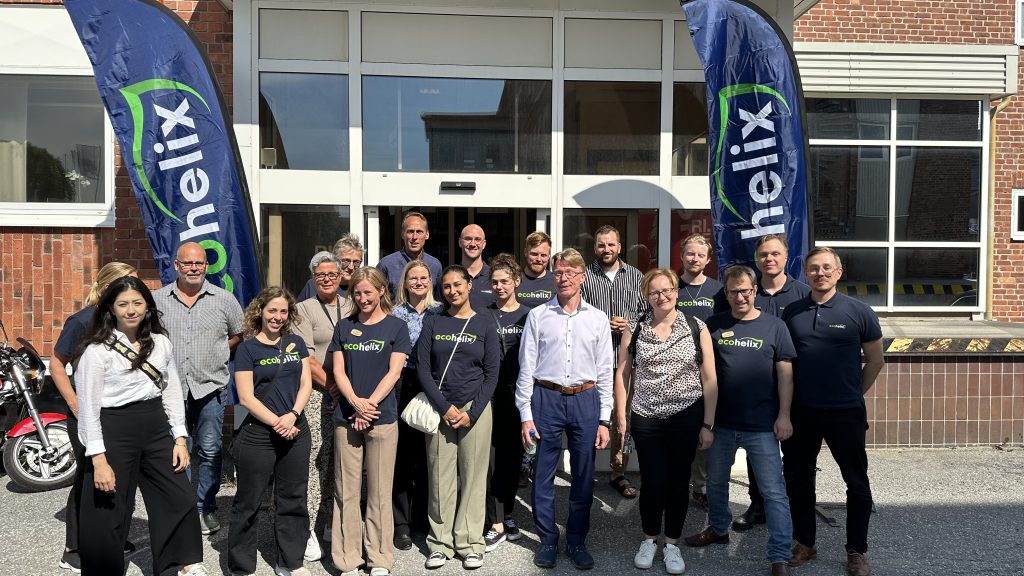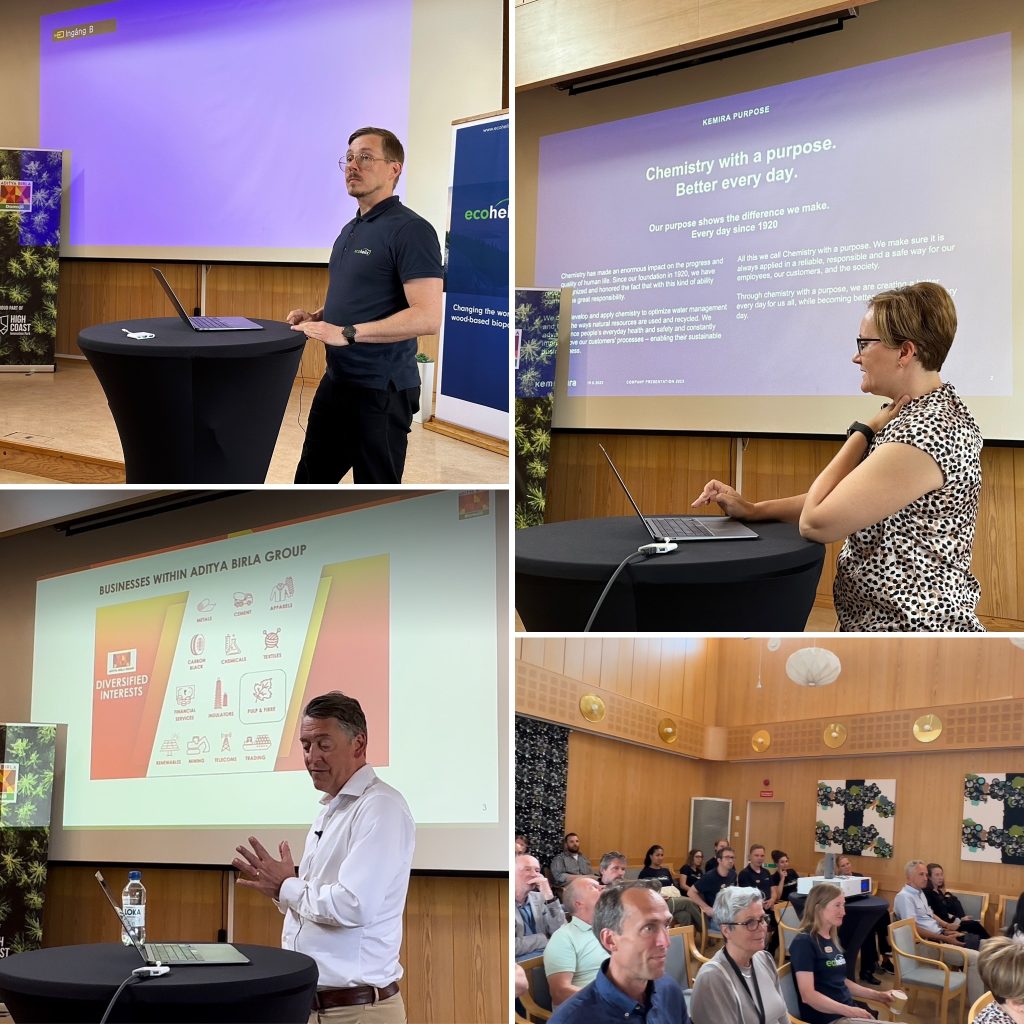Ecohelix had a pleasure to organize an event in Domsjö on Monday-Tuesday 19th-20th of June, gathering together partners and stakeholders as well as whole Ecohelix team. The event was hosted at Domsjö Fabriker, in the site, where Ecohelix has today a demo production plant and where Ecohelix full scale production site will be built. Together, there were around 40 participants in the event, enjoying presentations, discussions, demo site visit and the VEHICLE Project final review meeting.
Getting together
The event started with lunch at RICE Processum building. During the lunch, participants had a chance to discuss with each other and share their views on new material technology, sustainability development and innovations in that field. Among the stakeholders, there were representatives from Domsjö Fabriker, Kemira, Sweco, Spinverse and Örnskjöldsvik municipality.

Hearing from the partners and Ecohelix
The day continued with presentations from Domsjö Fabriker, Kemira and Ecohelix. Domsjö Fabriker´s Business Director, Cellulose Magnus Lundmark presented what Domsjö does today in terms of product lines and end products. Main products of Domsjö pulp mill are cellulose, lignin and bioethanol, which have the origin in sustainable Swedish forestry. Magnus highlighted the need for more sustainable materials in the products we use in our daily life. That is the base for Domsjö´s development and the company want´s to be in the forefront of the development of new sustainable materials.
“We need to be conscious, how we utilize the resources and one way to contribute to this is to invent technologies, which enable us to make more out of the wood, which is a sustainable raw material”, Magnus Lundmark stated.
Domsjö Fabriker and Ecohelix have had a strong partnership from the early days of Ecohelix and this partnership will be even stronger in the future. Magnus expressed the importance of reliability and capability for innovations, which both come from having the right people in right places and working seamlessly together. That´s the case within the partnership of Domsjö Fabriker and Ecohelix.

Raffaella Solda, Senior Research Scientist from Kemira started her presentation by covering global megatrends, changing demographics and urbanization and increasing environmental awareness, which are altering the world around us very dramatically. The growing middle class is using more water, energy, hygiene and packaging products. This means increasing environmental requirements in freshwater usage, energy, and materials technology. Through this, there is a focus on biobased and recyclable materials and the development is accelerated by tightening environmental regulation.
Kemira is focusing on two important industrial areas, Pulp&Paper and Industry&Water and has strong market positions in it´s chosen segments. In Pulp&Paper segment, Kemira´s competitive advantages come from chemical expertise, long customer relationships, broad offering for all Pulp&Paper applications and large operator offering delivering reliability. Kemira has strong R&D operations with 246 R&D experts in three global centers, providing excellent opportunities for product development and new innovations responding to the changing needs driven by the megatrends.
Being one of the key partners in VEHICLE project, Raffaella summarized project outcomes from Kemira´s perspective. Kemira has tested Ecohelix in many applications and overall, the project has been very successful. There were two biobased products for Pulp&Paper customers tested at TRL 6 level and the commercialization of these applications is under way.
Petri Oinonen, CEO and founder of Ecohelix introduced Ecohelix as a company, covering the idea, applicable markets, business opportunities, currently invented applications and possibilities in the future. Ecohelix WOODMER® biopolymers have their origin in sustainably sourced Nordic woods and the technology utilizes pulp industry side streams, turning currently untapped side streams into valuable, sustainable products.
Ecohelix sustainable WOODMER® biopolymers provide a sustainable alternative for formulators and brand owners. WOODMER® polymer possesses film forming and adhesive properties and is surface active which makes it highly useful in several different application areas, such as adhesive, dispersant, barrier, emulsifier and film former.
Petri emphasized also the excellent cooperation with Domsjö Fabriker, which has enabled Ecohelix journey from an lab scale R&D innovation project into industrial scale commercialization of this completely novel processing technology. Additionally, the cooperation with Kemira has been essential in reaching significant traction for the WOODMER®s on the market. This has made Ecohelix a considerable player on the biobased polymer market and enabled interest from several other customers in a range of application areas.
Petri announced also news about the 13 MSEK funding granted by Vinnova for Ecohelix demo production scaling from current 20 tn capacity up to 500 tn. This enables faster Ecohelix WOODMER® go to market with the first industry scale application.
Demo visit – introducing the core of Ecohelix
Presentations ended and the whole group started a site visit to see Ecohelix demo production unit. The tour was conducted by Karin Hägglund and Per Sixtröm from Ecohelix and Hans Grundberg from Domsjö Fabriker. They started by showing the control room, in which the whole process is managed. Raw material is the side stream of Domsjö pulp mill process. Ecohelix uses this material as the starting point for their polymer production.

Process starts with membrane filtration, which is used for the isolation, purification and upgrading of the Lignin Carbohydrate Complexes (LCC) by removing low molecular weight organic compounds as well as salts and chemicalsused by the pulp mill. Laccase enzyme is used in the reaction where it functions as a catalyst in the process to crosslink the lignin carbohydrate structures. This creates larger structures with increased molecular weight and the formation of longer co-polymers. After the enzymatic process the WOODMER® product is further purified by a second membrane filtration to remove the smaller organic compound and oligomers together with salts and water. This gives WOODMER® biopolymer it´s final properties, makes it controllable and enables the usage as a sustainable polymer component in various product applications.
The group was able to see current Ecohelix demo scale production unit, which is run in semi-continuous mode today, but will be upgraded in terms of the capacity and functionality. Ecohelix technical team has already tested continuous production with very good results. As per the plan, Ecohelix now continues to upscale the demo production plant into actual production plant with 500 tn capacity to bring the first applications to market in excellent partnerships with both Domsjö Fabriker and Kemira.
Successful days strengthening the partnerships
Ecohelix Domsjö Event participants were able to see each other and connect, hear from the partners, and see the actual Ecohelix production unit. All this gave a good opportunity to get to know each other even better, share ideas and strengthen already strong relationships.
Ecohelix roadmap for the future looks very bright. There are many applications tested and verified with industrial readiness and with the capacity ramp up, those applications will be brought to market. Additionally with strong application pipeline and ongoing customer trials, there are multiple applications available for market expansion.
Day one of Ecohelix Partner Event ended up to a joint dinner with all the participants, including the members of VEHICLE Project.

Day 2: VEHICLE Project Final Review Meeting
Ecohelix Partner Event in Domsjö continued on day two with final review meeting of VEHICLE Project. Participants to this meeting onsite were Siu-Ha Soo-Tang and Carlo Angelici from Avantium, Petri Oinonen, Nicola Giummarella, Oskar Schmidt, Rikard Slättegård, Eleonor Sallfeldt and Karin Hägglund from Ecohelix, Raffaella Solda from Kemira, Daniele Turati and Orsola Bolognani from Novamont, Nancy Pena from UVic, Pentti Launonen and Andreas Lindberg from Spinverse. BBI JU project officers and expert reviewers onsite were Lucia Fernandez Martinez (CBE JU Project Officer), Erja Ämmälahti (Aalto University) and Jalel Labidi (University of the Basque Country). Virtually participating were Ed De Jong and Pablo Gil Navarro from Avantium, Karl Peebo from Fibenol, Brita Asikanius and Tiina Liitiä from Kemira and Petri Ihalainen from MetGen.

In the meeting, participants presented the outcomes of different work packages and the overall outcomes of the project. All participants highlighted the importance of VEHICLE project as an enabler to bring new innovations to the market. It has also been a learning experience for the participants, increasing the readiness and capabilities for the future innovation projects. Overall the meeting was a great success and the partners were able to demonstrate at pilot scale that valorized products and intermediates can come from pulp mills waste. This is a huge step forward for the circular economy industry.
